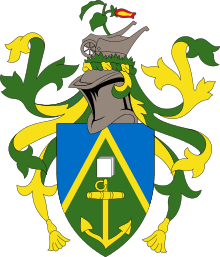Pitkern language
| Pitkern | |
|---|---|
|
Pitkern-Norfolk Pitcairn-Norfolk | |
| Native to | Norfolk Island, Pitcairn Islands, New Zealand |
Native speakers |
ca. 400 Pitcairn-Norfolk (2008)[1] 36 on Pitcairn (2002) |
|
English Creole
| |
| Dialects | |
| Official status | |
Official language in |
|
| Language codes | |
| ISO 639-3 |
pih Pitcairn-Norfolk |
| Glottolog |
pitc1234 Pitcairn-Norfolk[2] |
| Linguasphere |
52-ABB-dd |
Pitkern, also known as Pitcairn-Norfolk[1][2] or Pitcairnese, is a creole language based on an 18th-century dialect of English and Tahitian. It is a primary language of Pitcairn Islands, though it has more speakers on Norfolk Island. Unusually, although spoken on Pacific Ocean islands, it has been described as an Atlantic Creole.[3] There are about 70 speakers on Pitcairn Island, Britain's last remaining colony in the South Pacific.[4]
History
Following the Mutiny on the Bounty on April 28, 1789, the British mutineers stopped at Tahiti and took eighteen Polynesians, mostly women, to remote Pitcairn Island and settled there. Initially, the Tahitians spoke little English, and the Bounty crewmen knew even less Tahitian. Isolated from the rest of the world, they had to communicate with each other, and, over time, they formed a unique new language that blended a simplified English with Tahitian words and speech patterns.
Pitkern was influenced by the diverse English dialects and accents of the crew. Geographically, the mutineers were drawn from as far as the West Indies, with one mutineer being described as speaking a forerunner of a Caribbean patois. One was a Scot from the Isle of Lewis. At least one, the leader Fletcher Christian, was a well-educated man, which at the time made a major difference in speech. Both Geordie and West Country dialects have obvious links to some Pitkern phrases and words, such as whettles, meaning food, from victuals.
Common phrases
| Pitkern | English |
|---|---|
| Whata way ye? | How are you? |
| About ye gwen? | Where are you going? |
| You gwen whihi up suppa? | Are you going to cook supper? |
| I nor believe. | I don't think so. |
| Ye like-a sum whettles? | Would you like some food? |
| Do' mine. | It doesn't matter. I don't mind. |
| Wa sing yourley doing? | What are you doing? What are you up to? |
| I se gwen ah big shep. | I'm going to the ship. |
| Humuch shep corl ya? | How often do ships come here? |
| Cum yorley sulluns! | Come on all you kids! |
| I se gwen ah nahweh. | I'm going swimming. |
| Lebbe! | Let it be! |
| Gude | Good! |
Note: Pitkern spelling is not standardised.
Poetry in Pitkern
Some poetry exists in Pitkern. The poems of Meralda Warren are of particular note.
See also
References
- 1 2 Pitcairn-Norfolk at Ethnologue (18th ed., 2015)
- 1 2 Hammarström, Harald; Forkel, Robert; Haspelmath, Martin, eds. (2017). "Pitcairn-Norfolk". Glottolog 3.0. Jena, Germany: Max Planck Institute for the Science of Human History.
- ↑ Avram, Andrei (2003). "Pitkern and Norfolk revisited". English Today. 19 (1): 44–49. doi:10.1017/S0266078403003092. Retrieved 2007-04-09.
- ↑ Tryon, Darrell T.; Charpentier (2004). Pacific Pidgins and Creoles. Berlin: Jean-Michel. p. 11. ISBN 3-11-016998-3.
External links
- Ross, Alan Strode Campbell and A.W. Moverly. The Pitcairnese Language (1964). London: Oxford University Press.
- South Pacific phrasebook (1999). Hawthorn, Australia: Lonely Planet Publications.
| Norfuk / Pitkern edition of Wikipedia, the free encyclopedia |
